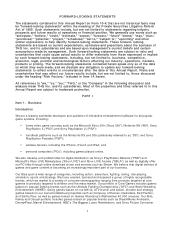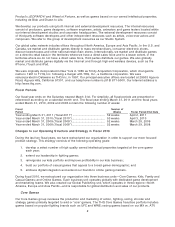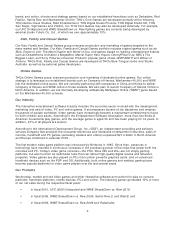THQ 2010 Annual Report Download - page 19
Download and view the complete annual report
Please find page 19 of the 2010 THQ annual report below. You can navigate through the pages in the report by either clicking on the pages listed below, or by using the keyword search tool below to find specific information within the annual report.11
increased costs are not offset by higher net sales and other cost efficiencies in the future, our margins and
profitability will continue to be impacted, and could result in impairment of capitalized software development
costs. If these platforms, or games we develop for these platforms, do not achieve significant market
penetration, we may not be able to recover our development costs, which could result in the impairment of
capitalized software costs, which would negatively impact our profitability.
We rely on a small number of cus tomers tha t account for a significant amount of our sales . I f
these cus tomers reduce their purchases of our product s or become unable to pay for them, our
business could be harmed.
Our largest customers, Best Buy, GameStop, Target and Wal-Mart, accounted for approximately 43% of our
gross sales in fiscal 2010. A substantial reduction, termination of purchases, or business failure by any of our
largest customers could have a material adverse impact on us.
A significant portion of our net sales are derived from our international operations , which may
subject us to economic, currency , political, regulatory and other ris ks .
In fiscal 2010, we derived 38% of our net sales from outside of North America. Our international operations
subject us to many risks, including: different consumer preferences; challenges in doing business with foreign
entities caused by distance, language and cultural differences; unexpected changes in regulatory
requirements, tariffs and other barriers; difficulties in staffing and managing foreign operations; and possible
difficulties collecting foreign accounts receivable. These factors or others could have an adverse impact on
our future foreign sales or the profits generated from those sales.
There are additional risks inherent in doing business in certain international markets, such as China. For
example, foreign exchange controls may prevent us from expatriating cash earned in China, and standard
business practices in China may increase our risk of violating U.S. laws such as the Foreign Corrupt Practices
Act.
Additionally, sales generated by our international offices will generally be denominated in the currency of the
country in which the sales are made, and may not correlate to the currency in which inventory is purchased,
or software is developed. To the extent our foreign sales are not denominated in U.S. dollars, our sales and
profits could be materially and adversely impacted by foreign currency fluctuations. Year-over-year changes
in foreign currency translation rates had the mathematical effect of increasing our reported net loss by
approximately $0.2 million in fiscal 2010.
Fluctuations in our quarterly operating results due to seasonality in the interacti ve entertainment
sof tware industr y and other factors related to our business operations could result in substantial
losses to investors.
We have experienced, and may continue to experience, significant quarterly fluctuations in sales and
operating results. The interactive entertainment software industry is highly seasonal, with sales typically
significantly higher during the year-end holiday buying season. Other factors that cause fluctuations in our
sales and operating results include:
• the timing of our release of new titles as well as the release of our competitors’ products;
• the popularity of both new titles and titles released in prior periods;
• the profit margins for titles we sell;
• the competition in the industry for retail shelf space;
• fluctuations in the size and rate of growth of consumer demand for titles for different platforms;
• the timing of the introduction of new platforms and the accuracy of retailers’ forecasts of consumer
demand; and
• the deferral or subsequent recognition of net sales and costs related to certain of our products which
contain online functionality.
























